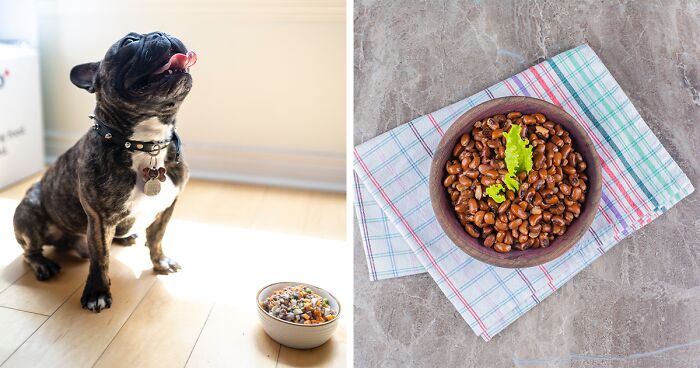
Can Dogs Eat Beans? Types of Beans and Legumes That Your Dog Can Safely Enjoy
Have you ever wondered if your furry companion can share in the nutritional benefits of beans? Beans are common in our food, but can they also be good for your dog? Is it safe for your dogs to eat beans, and what kinds should they have?
Beans, in moderation, are a healthy addition to a dog’s diet. Green beans, black beans, lima beans, pinto beans, garbanzo beans, kidney beans, lentils, navy beans, and soybeans offer protein, fiber, vitamins & minerals. When properly prepared, all these beans can enhance your dog’s health.
- Cooked green, black, lima & other beans are safe for dogs in moderation.
- Dogs should not consume refried, chili, baked, or canned beans regularly.
- Certain raw beans & coffee beans are highly toxic to dogs.
- To prepare beans for dogs, soak and cook them without seasonings.
- Beans should only be a small part of a dog's diet, as treats or snacks.
Stay tuned as we delve deeper into the world of beans and legumes for dogs. You’ll learn:
- Which beans are safe?
- How they help your dog.
- The best ways to add them to your dog’s food.

The information provided herein is for informational purposes only. Please refer to our disclaimer for more details..
Are Beans Good for Dogs?
If you prepare beans the right way, they can be a healthy part of your dog’s food. Dogs are omnivores – so they can benefit from these beans. Beans are good because they have:
- Protein.
- Fiber.
- Vitamins (like A, C, and K).
- Minerals (such as iron, potassium, and magnesium).
They don’t have much fat, and their fiber helps keep blood sugar levels stable.
But it’s important not to give your pup too many beans. Feeding your dog beans a lot can cause problems like constipation, or it can make them gassy. And, when you start giving beans to your dog, mix a little bit with their usual food, this helps your dog get used to them slowly and avoids digestive discomfort.
Top Advantages of Beans for Dogs
Beans, a versatile and nutritious food, offer a range of benefits for dogs. Let’s uncover how these simple legumes can significantly improve your dog’s health and well-being.
- Rich in Essential Nutrients: Beans are incredibly valuable for your dog’s health. For example, Black beans contain vitamin C, K, and manganese. And they provide important protein and fiber. These nutrients are crucial – they help strengthen your dog’s immune system and aid in their digestion.
- Protein-Packed: As a source of plant-based protein, beans are super beneficial for dogs. They play a big part in building and keeping up muscle mass. And they’re important for the health of other body parts like skin and hair. This makes beans a great choice to add to or replace animal-based proteins in your dog’s diet.
- Antioxidant-Rich: Black beans are not only easy to find but also safe for dogs and filled with antioxidants. These antioxidants fight off harmful free radicals. So, they really support your dog’s immune system and keep them healthy overall.
- Promotes Digestive Health: Beans, rich in dietary fiber, are key to good digestive health for dogs. They help make bowel movements better and stop constipation. That means your dog’s digestive system stays in good shape.
- Packed with Additional Nutrients: Besides protein and fiber, beans contain lots of other good stuff. They’re rich in potassium, magnesium, iron, folate, B vitamins & different phytonutrients. These elements are super important for many body functions – they help keep blood pressure healthy and support strong bones, among other things.
What Kind of Beans Can Dogs Eat?
With over 400 varieties of beans worldwide, it might seem overwhelming. But only a few are commonly found in stores, and luckily, several are great for dogs. Here are the beans your dog can safely enjoy:
1. Green Beans (String Beans)
Green beans are perfect for dogs as a healthy treat. They’re low in calories yet packed with fiber. And these beans also contain essential vitamins like K, A, and C & important minerals like potassium and folate. But – be cautious with the strings on green beans. They can be a choking risk for your dog. It’s best to chop them into smaller pieces before feeding them to your pet.
2. Black Beans
These beans are a treasure trove of antioxidants that are good for your dog. They’re also rich in fiber, potassium, and magnesium. When preparing these beans for your dog, keep them simple and cook them without adding any strong spices or seasonings that could harm your dog.
3. Lima Beans (Butter Beans)
Lima beans are a fantastic choice for your dog’s diet. They’re loaded with fiber and protein. These help your dog maintain a healthy weight. Also, they keep the digestive system running well and make your dog feel full. Packed with nutrients like calcium, phosphorus, iron & magnesium – these beans are beneficial in many ways. These make a convenient addition to your dog’s meal and are available in:
- Dried form.
- And frozen form.
4. Pinto Beans
Pinto beans are also safe and good for dogs. They provide fiber, protein & antioxidants. They contribute to your pet’s immune system health. These are only ideal when cooked simply without flavorful seasonings.
5. Garbanzo Beans (Chickpeas)
Chickpeas are another great option. They are high in protein and fiber. And it’s important to cook them thoroughly before giving them to your dog. But be sure to steer clear of chickpea-based spreads like hummus. These often contain garlic or other ingredients that are harmful to dogs.
6. Kidney Beans
Kidney beans can be dangerous for dogs if they’re raw because of their high phytohaemagglutinin content – a toxin harmful to dogs. But, when they are cooked, kidney beans become safe in small amounts. They are filled with protein, fiber, antioxidants, and essential vitamins. And always monitor the quantity, as too many can be harmful.
7. Lentils
Lentils are safe for dogs, but only if they’re completely cooked. They come in two types:
- Split.
- Whole.
Split lentils are softer and turn a bit like porridge when cooked. While whole lentils keep their shape after cooking.
Both types provide iron, fiber & protein, making them a healthy addition to your dog’s diet.
8. Navy Beans
These are small, white beans that are best for your dog when cooked from their dried form. You should avoid canned navy beans because they often have salt and preservatives, which aren’t good for dogs.
9. Soybeans (Edamame)
Soybeans – also known as edamame in their immature form – are a great source of protein and are commonly found in dog food. They can be served to your dog either raw or cooked. Soybeans are rich in:
- Omega-3 fatty acids.
- Calcium.
- And vitamin C, making them a nutritious option for dogs.
Edamame, the young soybean, is also safe and healthy for your dog to eat.
Types of Beans You Shouldn’t Give Dogs To Eat
While beans are generally good for your pup, some types are not safe. Here’s a list of beans you should avoid:
- Refried, Chili, and Baked Beans: These popular bean varieties often contain high levels of fat and spices – such as garlic, onion, cumin, and chili powder. Which are harmful to dogs. Refried beans have a lot of fat, which can cause pancreatitis. Baked and chili beans may also have extra sugar & spices that can upset your dog’s stomach.
- Canned Beans: Although convenient, canned beans aren’t the best dog choice. They usually have a lot of sodium – which is harmful – especially for dogs with heart conditions or high blood pressure. And, giving your dog a small, rinsed portion once in a while might be okay. Beans can cause health problems in the long run if eaten regularly.
- Coffee Beans: Caffeine in coffee beans is highly toxic to dogs. If they eat them, they might:
- Vomit.
- Have seizures.
- Their heart rate can go up.
- And they could even collapse.
If your dog eats coffee beans, you must get them to a vet immediately.
- Raw Beans and Bean Shells: Beans like fava beans, lima & edamame beans are not safe for dogs when they’re raw. So you should cook them well before giving them to your dog. Also – don’t give your dog the shells or pods of these beans. Because they contain harmful chemicals.
- Castor Beans: Even a little bit of castor beans can make your dog very sick. They can cause:
- Mouth pain.
- Vomiting.
- Diarrhea.
- Kidney problems.
- And even seizures.
These beans are super toxic, and you should completely keep your dog away from them.
- Fava Beans (Broad Beans): Cooking fava beans can eliminate some bad stuff, but they still have a toxin called phytohaemagglutinin (PHA). This is a problem because of their big size & tough skin. If your dog eats these beans – they might vomit, have diarrhea, and feel very tired.
How To Safely Prepare Beans for Dogs
Getting beans ready for your dog the right way is important. This makes sure they get the health benefits without any bad effects. Here’s how to do it:
- Choose Dried Beans Over Canned: Opt for dried beans purchased in bulk rather than canned varieties – as canned beans often contain high sodium levels.
- Soaking is Crucial: Soak dried beans overnight. This is a key step because it reduces cooking time and makes the beans easier for your dog to digest.
- Thorough Cooking: Prepare the beans like you would for people. They need to be cooked well & if beans are raw or not cooked enough, they can upset your dog’s stomach or cause diarrhea.
- Avoid Seasonings and Additives: Make sure to cook the beans plain. And don’t add any salt, spices, or seasonings. Because dogs’ stomachs are sensitive to these things.
How Many Beans Your Dog Can Eat Safely
Determining the right amount of beans for your dog involves a balance between nutritional benefits and potential digestive issues. Beans are good for them, but they should only be a small part of their diet. Here’s how to know the right amount:
- Treats and Snacks Rule: Beans, as treats, shouldn’t be more than 10% of your dog’s daily calories.For Example: If they need 700 calories a day – only 70 should come from treats like beans.
- Introduce Slowly: Start by mixing a few plain, cooked beans into their normal food. And this slow start helps you watch for any stomach issues like gas or diarrhea. Change the amount depending on how your dog handles it.
- Size Matters: How much to give also depends on your dog’s size. Small dogs, like Yorkies, only need a teaspoon. But bigger dogs, like Great Danes, can have up to half a cup of cooked beans.
- Consult Your Vet: Always talk to your vet before big diet changes for your dog. This makes sure it’s right for their specific health needs.
Conclusion
As you navigate the journey of responsible and loving dog ownership, understanding the role of beans in your furry friend’s diet is essential. The different types of beans that are safe for dogs, like black & green beans, offer a healthy snack choice. And they also add important nutrients like protein, fiber, and vitamins to their diet.
Remember – it’s important not to give too much. Adding beans to your dog’s diet slowly is best for their health. When you pick the right beans and prepare them correctly, you help keep your dog healthy and happy. Embrace this knowledge as a tool to enhance your dog’s diet, making every mealtime both enjoyable and beneficial.
179views
Share on Facebook
 Dark Mode
Dark Mode 

 No fees, cancel anytime
No fees, cancel anytime 






 Image credits:
Image credits: 











































-2
0